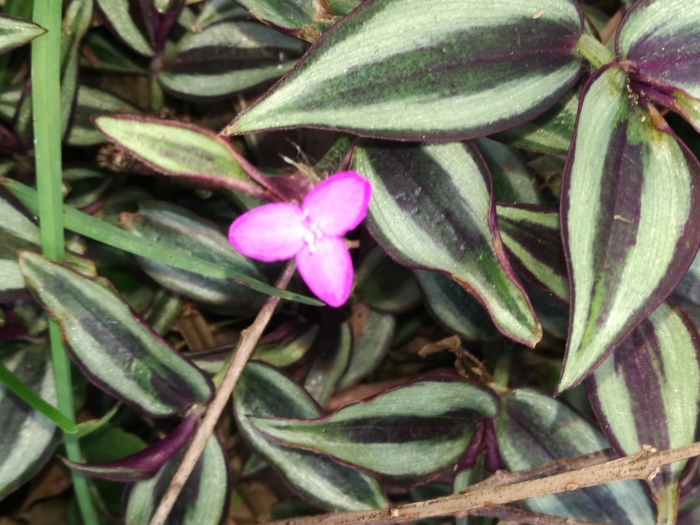Silver Inch Plant
(Tradescantia zebrina)
Silver Inch Plant (Tradescantia zebrina)
/
/

chrishorak
CC BY 4.0
Image By:
chrishorak
Recorded By:
Copyright:
CC BY 4.0
Copyright Notice:
Photo by: chrishorak | License Type: CC BY 4.0 | License URL: http://creativecommons.org/licenses/by/4.0/ | Rights Holder: chrishorak | Publisher: iNaturalist | Date Created: 2020-12-18T13:53:34-08:00 |


















































Estimated Native Range
Summary
Tradescantia zebrina, commonly known as Silver Inch Plant, is an evergreen perennial herb native to the understory of tropical forests in Mexico and Central America to Colombia. It typically grows to a height of 0.5-0.8 feet and a width of 1-2 feet. The plant is characterized by its striking foliage, which features purplish stripes on the upper surface and a deep purple underside. It produces small, three-petaled flowers in shades of blue, pink, purple, and white, primarily during the spring and winter months. The flowers are modest in size but can add a subtle charm to the plant’s overall appearance.
Tradescantia zebrina is valued for its rapid growth and attractive variegated leaves, which make it a popular choice for indoor plant collections and as a groundcover in frost-free regions. It is often used in hanging baskets, terrariums, and as an accent in mixed container plantings. In cultivation, it prefers bright, indirect light or part shade, consistent moisture, and well-draining soil. While it can tolerate a range of soil types, it thrives in a rich, loamy mix. The plant is not frost-tolerant but can be overwintered indoors in colder climates. It is known for its ease of propagation through stem cuttings, which root readily. However, gardeners should be cautious as it can become invasive in suitable climates, spreading aggressively and potentially outcompeting native species. It is hardy in USDA hardiness zones 9 through 11.CC BY-SA 4.0
Tradescantia zebrina is valued for its rapid growth and attractive variegated leaves, which make it a popular choice for indoor plant collections and as a groundcover in frost-free regions. It is often used in hanging baskets, terrariums, and as an accent in mixed container plantings. In cultivation, it prefers bright, indirect light or part shade, consistent moisture, and well-draining soil. While it can tolerate a range of soil types, it thrives in a rich, loamy mix. The plant is not frost-tolerant but can be overwintered indoors in colder climates. It is known for its ease of propagation through stem cuttings, which root readily. However, gardeners should be cautious as it can become invasive in suitable climates, spreading aggressively and potentially outcompeting native species. It is hardy in USDA hardiness zones 9 through 11.CC BY-SA 4.0
Plant Description
- Plant Type: Herb
- Height: 0.5-1 feet
- Width: 1-2 feet
- Growth Rate: Rapid
- Flower Color: N/A
- Flowering Season: Spring, Summer
- Leaf Retention: Evergreen
Growth Requirements
- Sun: Part Shade
- Water: Medium
- Drainage: Medium
Common Uses
Groundcover, Low Maintenance, Potted Plant, Street Planting
Natural Habitat
native to the understory of tropical forests in Mexico and Central America to Colombia
Other Names
Common Names: Inchplant, Wandering-Jew, Wandering Dude, Silber-Dreimasterblume
Scientific Names: , Tradescantia zebrina, Zebrina pendula, Tradescantia zebrina subsp. zebrina, Commelina zebrina, Cyanotis zebrina, Zebrina pendula var. pendula, Zebrina pendula var. quadrifolia,
GBIF Accepted Name: Tradescantia zebrina Bosse